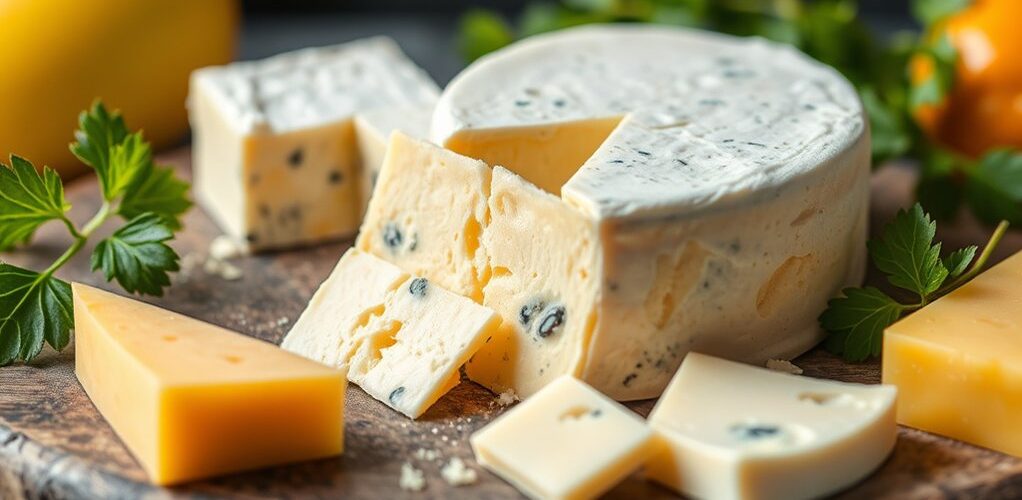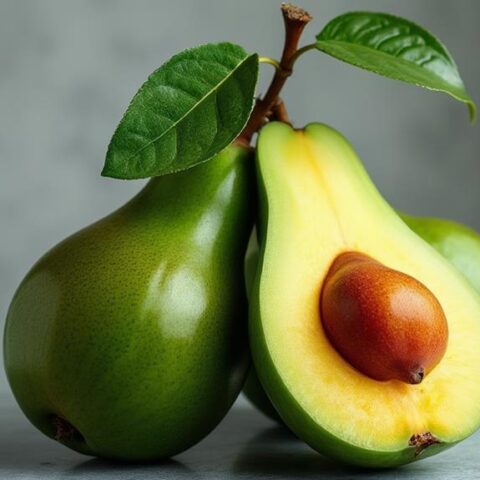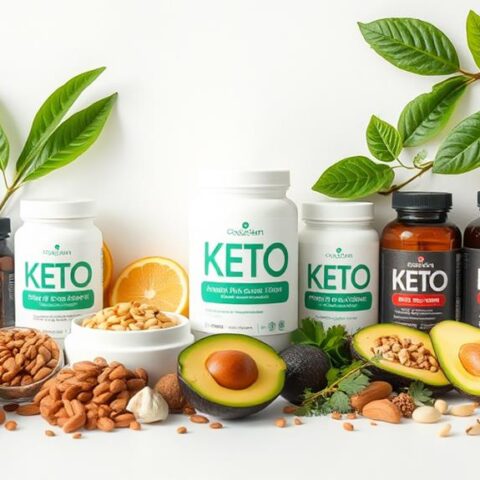
Most natural cheeses contain minimal carbohydrates, typically 0-2 grams per serving. Aged varieties like cheddar, Swiss, and Parmesan have less than 1 gram per ounce, while goat cheese contains virtually zero carbs. However, processed varieties and certain fresh cheeses like cottage cheese can contain higher amounts, ranging from 4-9 grams per serving. Understanding the distinctions between cheese types enables ideal selection for low-carb dietary goals.
Key Takeaways
- Most natural cheeses are very low in carbohydrates, containing only 1-2 grams of carbs per ounce serving.
- Hard cheeses like cheddar, Swiss, and gouda are excellent low-carb options with less than 1 gram per serving.
- Processed and low-fat cheese varieties often contain added starches and sugars, making them higher in carbohydrates.
- Cottage cheese and ricotta have higher carb content, with 4-5 grams per half-cup serving.
- Aged cheeses and goat cheese are particularly low-carb friendly, with some containing virtually zero carbohydrates.
Understanding Carbohydrates in Different Cheese Types
When examining the carbohydrate content of cheese varieties, significant differences emerge across types. Most natural cheeses contain minimal carbs, typically 1-2 grams per ounce, making them suitable for keto and low-carb dietary protocols. Goat cheese stands out as particularly low-carb, containing virtually zero carbohydrates per ounce. Blue cheese and Parmesan also maintain remarkably low carb counts, with 0.5 grams per slice and 0.7 grams per tablespoon, respectively. However, cottage cheese deviates from this pattern, containing approximately 5 grams of carbs per half-cup serving. Processed and flavored cream cheeses often harbor higher carbohydrate levels due to additional ingredients. For those monitoring carb intake, careful label reading becomes essential, particularly when selecting manufactured cheese products. It is important to note that while most cheeses are low in carbs, hard cheeses like Parmesan and Swiss are preferred for keto due to their low carbohydrate content and high protein levels.
The Role of Cheese in Low-Carb Diets
Cheese serves as an essential component of low-carb diets due to its minimal carbohydrate content, with most varieties containing less than 1 gram per serving.
The nutritional profile of cheese extends beyond its low-carb nature, offering substantial protein and calcium while providing satiety through its fat content.
Common options like cheddar, Swiss, and goat cheese contain negligible carbohydrates while delivering essential nutrients, making them valuable additions to low-carb meal plans.
Additionally, cheese is rich in healthy fats that promote satiety and can enhance the flavor of keto-friendly meals.
Cheese's Nutritional Carb Content
For individuals following low-carb dietary protocols, most natural cheeses offer an excellent nutritional choice due to their minimal carbohydrate content. The carb content in cheese typically ranges from 0 to 2 grams per ounce, with certain varieties containing virtually no carbohydrates.
Goat cheese and blue cheese represent ideal low-carb cheeses, containing fundamentally zero carbohydrates per ounce. Similarly, cheddar cheese contains approximately 0.59 grams of carbs per ounce, while Swiss cheese contains 0.4 grams.
However, processed varieties like American cheese contain higher amounts, approximately 9 grams per 100 grams. Cottage cheese warrants careful portion control, containing up to 6.8 grams of carbs per cup.
For precise carbohydrate tracking, consulting nutritional labels remains crucial, as carbohydrate content can vary between brands and varieties.
Benefits Beyond Fat Control
Beyond its minimal carbohydrate content, incorporating cheese into low-carb dietary protocols offers substantial health advantages supported by scientific research.
Clinical studies demonstrate that cheese provides essential nutrients, including calcium, protein, and B vitamins, while containing bioactive peptides that may reduce inflammation and improve cardiovascular health.
A thorough 2017 meta-analysis revealed that sustained cheese consumption doesn't increase mortality risk, validating its role in a low-carb diet.
Additionally, research indicates that consuming 55 grams of cheese daily correlates with a 12% decreased risk of type 2 diabetes development.
The health benefits extend to metabolic syndrome management, as low-carb diets incorporating cheese have shown clinical efficacy.
These findings underscore cheese's value not merely as a low-carb food but as a nutrient-dense component supporting overall health outcomes.
Best Low-Carb Cheese Selections
When selecting cheeses for a low-carbohydrate diet, several varieties stand out for their minimal carb content.
Goat cheese leads the category with virtually zero carbohydrates per 1-ounce serving, while blue cheese maintains a minimal 0.5 grams per slice.
For carb-conscious dining, goat cheese offers a zero-carb option, while blue cheese provides a mere half-gram per slice.
Swiss cheese contains just 0.4 grams of carbohydrates per ounce, making it an excellent option for those monitoring their carb intake.
Parmesan cheese offers remarkable versatility with only 0.7 grams of carbohydrates per tablespoon, proving especially suitable for garnishing dishes.
Cream cheese, containing 1 gram of carbohydrates per ounce, serves as a fundamental ingredient in low-carb cooking.
These cheese varieties provide protein and essential nutrients while maintaining exceptionally low carbohydrate profiles, making them ideal selections for ketogenic and low-carb dietary protocols. For those following a keto diet, choosing sweeteners like stevia can help maintain ketosis while enjoying sweetness in food.
High-Carb Cheeses to Avoid
Several cheese varieties contain higher carbohydrate levels that can disrupt low-carb dietary goals.
When monitoring carbs in cheese, certain varieties emerge as potentially problematic for strict low-carb eating plans. Scientific analysis reveals specific high-carb cheeses to avoid for ideal dietary compliance.
- Cottage cheese contains 4.5g carbs per ½-cup serving, making it a higher-carb option.
- American cheese delivers approximately 9g carbs per 100g portion.
- Processed cheese products, including canned varieties, contain roughly 1g carbs per tablespoon plus additional fillers.
- Ricotta cheese provides 4g carbs per ½-cup serving.
For those following carbohydrate-restricted diets, these cheese varieties require careful portion control or complete avoidance.
Mild cheddar, with 0.4g carbs per ¾-ounce slice, also warrants consideration due to its higher carb content compared to sharp varieties.
Health Benefits of Low-Carb Cheese Options
Despite their minimal carbohydrate content, low-carb cheese varieties offer substantial health benefits supported by scientific research. Studies indicate that regular consumption of low-carb cheese options correlates with a 12% decreased risk of type 2 diabetes, while full-fat varieties demonstrate a positive association with lower body mass index.
Specific cheese options provide unique health benefits. Aged Parmesan, containing just 0.9g of carbohydrates per ounce, delivers significant protein and calcium for ideal bone health.
Parmesan cheese stands out as a nutrient powerhouse, offering substantial protein and calcium while containing minimal carbohydrates per serving.
Blue cheese contains bioactive peptides that may reduce cholesterol levels and decrease inflammation. Goat cheese, another low-carb option, offers similar nutritional advantages.
Meta-analyses support these findings, showing that cheese consumption does not increase mortality risk, making these dairy products valuable components of a balanced, health-conscious diet. A ketogenic diet, known for its reduction in HbA1c levels, also aligns well with the consumption of low-carb cheese, further supporting its benefits in managing type 2 diabetes.
Portion Control Guidelines for Cheese Consumption
Maintaining a low-carb lifestyle through cheese consumption requires careful attention to portion sizes. Effective portion control involves limiting cheese intake to approximately one ounce (28 grams) per serving, which typically contains 1-2 grams of carbs. This measured approach helps individuals stay within their daily carbohydrate limits while enjoying cheese's nutritional benefits.
- Standard serving size of 1 ounce applies to most hard and soft cheeses
- Higher-carb varieties like cottage cheese should be limited to ½-cup portions
- Spread cheese consumption between one meal and one snack daily
- Check product labels for accurate carb content, as processed varieties may contain hidden carbohydrates
Regular monitoring of serving sizes promotes ideal carb management while incorporating cheese into a low-carb diet. This structured approach prevents overconsumption while maintaining dietary compliance.
Reading Cheese Labels Like a Pro
Understanding cheese labels is a critical skill for consumers following a low-carb diet, as subtle variations in ingredients and processing methods can considerably impact carbohydrate content. When examining cheese labels, consumers should first identify the serving size, as carb content varies considerably between portions. Full-fat, minimally processed cheeses typically contain fewer carbohydrates than their low-fat counterparts, with cheddar cheese containing less than 1 gram per ounce. Processed cheeses often include non-dairy additives and preservatives that increase carb content. Specialty and flavored varieties require particular scrutiny, as manufacturers may add sugars or starches that raise carbohydrate levels. For accurate tracking, consumers should compare standard measurements across different cheese types, noting that goat cheese contains 0 grams of carbs per ounce, while cottage cheese contains 5 grams per half-cup serving. It's crucial to be aware of hidden added sugars in cheese products, as they can disrupt ketosis and impact your low-carb diet significantly.
Common Myths About Cheese and Carbs
While cheese plays a prominent role in many diets, several misconceptions persist regarding its carbohydrate content. Common belief suggests cheese is high in carbohydrates, yet scientific evidence demonstrates most varieties contain minimal carbs, making them suitable for low-carb eating plans. Most hard cheeses, including cheddar and gouda, contain less than 2 grams of carbs per ounce. Goat cheese and feta contain zero grams of carbohydrates per serving. Aged Parmesan averages only 0.9 grams of carbs per ounce. Cottage cheese contains higher carbs at 5 grams per half-cup serving. Research indicates that processed varieties like American cheese typically contain more carbohydrates and additives than natural cheeses. Understanding these distinctions enables consumers to make informed choices, particularly when following ketogenic or other carbohydrate-restricted dietary protocols. Additionally, the keto diet's impact on cholesterol levels can vary, emphasizing the importance of choosing high-quality fats and monitoring health metrics.
Creative Ways to Include Low-Carb Cheese in Meals
Creating an elegant low-carb cheese board involves selecting aged varieties like Parmesan and blue cheese, which typically contain fewer than 1 gram of carbs per serving. Aged cheeses offer concentrated flavors that enhance dishes without requiring large portions, making them ideal for maintaining ketogenic macronutrient ratios. These mature cheeses can be effectively incorporated into cooking through techniques such as grating over hot dishes, melting into sauces, or baking into crispy garnishes. Additionally, pairing cheeses with low-carb vegetables such as spinach and zucchini can provide balanced nutrition while keeping carb intake low.
Easy Cheese Board Ideas
Assembling an aesthetically pleasing cheese board requires strategic selection of low-carb varieties and complementary ingredients. A well-curated selection features cheeses containing 0-1 gram of carbs per ounce, including aged cheddar, blue cheese, and goat cheese, while incorporating diverse textures and flavors.
Essential components for a keto-friendly cheese board include:
- Soft cheeses like cream cheese and feta for creamy textures
- Hard aged varieties such as cheddar for robust flavor profiles
- Low-carb accompaniments including cucumbers, olives, and nuts
- Dehydrated cheese crisps for textural contrast
To enhance the presentation, arrange cheeses from mild to strong and drizzle with olive oil or balsamic vinegar. This combination guarantees peak flavor while maintaining ketogenic dietary requirements, offering approximately 0-1 grams of carbohydrates per serving.
Cooking With Aged Cheeses
Aged cheeses serve as versatile ingredients in low-carb cooking due to their concentrated flavors and minimal carbohydrate content. With Parmesan containing merely 0.9 grams of carbs per ounce, it provides an excellent option for enhancing dishes while maintaining ketogenic dietary requirements.
These aged cheeses excel in various culinary applications. Grated Parmesan effectively enhances roasted vegetables, while aged Gouda, containing approximately 1 gram of carbs per ounce, creates rich, low-carb sauces.
For those following carbohydrate-restricted diets, aged cheeses can be incorporated into salads, particularly when combined with mixed greens and blue cheese crumbles. Additionally, these cheeses complement other low-carb ingredients like nuts and cured meats, offering satisfying meal options while adhering to dietary goals.
Impact of Processing on Cheese Carb Content
The extent of processing in cheese production directly influences its carbohydrate content, with more processed varieties containing considerably higher carb levels.
Heavily processed cheese products contain significantly more carbohydrates than natural cheese due to manufacturing additives and fillers.
Analysis reveals that highly processed cheeses often incorporate additional ingredients that raise their carb counts, making them less suitable for low-carb dietary protocols.
Key findings regarding processing impact:
- American cheese contains approximately 9g of carbs per 100g due to processing additives
- Natural, aged cheeses like cheddar maintain less than 1g of carbs per ounce
- Low-fat cheese varieties frequently contain added starches and sugars to compensate for fat removal
- Canned and spray cheeses exceed 2g of carbs per ounce due to stabilizers and fillers
Scientific evidence demonstrates that minimally processed, full-fat cheeses remain the best choice for maintaining lower carbohydrate intake while preserving traditional cheese nutritional profiles.
Cheese Alternatives for Special Dietary Needs
For individuals following special dietary requirements, numerous cheese alternatives exist in the modern market.
Plant-based options include nut-based cheeses made from almonds or cashews, as well as alternatives derived from soy, coconut, or nutritional yeast, which can provide similar flavors while maintaining low carbohydrate content.
Lactose-intolerant individuals can opt for specially processed lactose-free cheeses that retain the nutritional benefits of traditional cheese while eliminating digestive concerns.
Plant-Based Cheese Options
When following a low-carb diet, plant-based cheese alternatives offer varying levels of carbohydrate content depending on their base ingredients and manufacturing processes.
These products, often made from nuts, soy, or coconut, can range from 1 gram to markedly higher amounts of carbohydrates per serving.
Key considerations for plant-based cheeses include:
- Nutritional yeast content, which provides cheesy flavor while remaining low in carbs
- Added fortification with essential nutrients like calcium and vitamin B12
- Presence of added sugars or starches that may increase carbohydrate content
- Protein and fat content, which may differ from traditional dairy cheese
Careful examination of ingredient labels is essential when selecting plant-based cheeses for a low-carb diet, as manufacturing processes and additives can greatly impact their carbohydrate content and overall nutritional profile.
Lactose-Free Cheese Choices
Beyond plant-based alternatives, individuals seeking low-carb cheese options while managing lactose intolerance have numerous viable choices within traditional cheese categories.
Aged cheeses like cheddar, Swiss, and Parmesan naturally contain minimal lactose due to their production process, making them suitable for lactose-sensitive consumers. Goat cheese presents another favorable option, containing lower lactose levels than conventional cow's milk varieties.
For those preferring familiar textures and flavors, manufacturers now produce lactose-free versions of popular cheeses, including mozzarella and cream cheese, through enzymatic treatment.
While plant-based cheese alternatives made from nuts, soy, or coconut provide completely lactose-free options, consumers should carefully examine ingredient labels across all categories to identify potential additives or preservatives that may impact their dietary goals or overall health considerations.
Tips for Smart Cheese Shopping
Making informed choices at the cheese counter requires understanding which varieties best align with low-carb dietary goals. Selecting minimally processed, full-fat options guarantees maximum nutritional value while maintaining lower carbohydrate content.
Block cheeses typically contain fewer additives than pre-shredded varieties, making them superior choices for low-carb dieting.
Key considerations when purchasing cheeses:
- Examine nutrition labels carefully, particularly for cottage cheese and processed varieties that may contain hidden carbs.
- Choose natural cheeses like goat cheese, blue cheese, and cheddar, which contain less than 1g carbs per ounce.
- Select full-fat options over reduced-fat alternatives to avoid added sugars and fillers.
- Opt for block cheese rather than pre-sliced or shredded versions to minimize exposure to carb-increasing additives and preservatives.
- Understanding net carbohydrates is crucial for keto management, as it helps prevent excessive carb consumption by subtracting dietary fiber and sugar alcohols from total carbohydrates.
Frequently Asked Questions
Which Cheese Is Lowest in Carbohydrates?
Among cheese types analyzed, goat cheese and feta contain virtually zero carbohydrates per serving, offering ideal choices for minimizing carbohydrate content while maintaining significant nutritional benefits like protein and calcium.
Can I Eat Cheese on My Low-Carb Diet?
Most cheese types are compatible with low-carb diets, offering nutritional benefits while containing minimal carbohydrates. Monitoring portion control remains essential, with hard and aged varieties providing the lowest carb content per serving.
Can You Eat as Much Cheese as You Want on Keto?
Unrestricted cheese consumption on keto isn't advisable. Proper cheese portion control supports effective keto weight management. Despite being low-carb, moderation prevents excess calorie intake and helps manage cheese cravings solutions effectively.
Does Cheese Have Any Carbs in It?
Most cheese types contain minimal carbohydrates, ranging from 0-2 grams per ounce. Nutrition facts vary by variety, with goat cheese containing zero carbs while cottage cheese delivers higher amounts per serving.
Conclusion
Most natural cheeses are inherently low in carbohydrates, containing less than 1 gram per serving, making them suitable for low-carb dietary patterns. However, processed cheese products and certain specialty varieties may contain added carbohydrates. When selecting cheese for a low-carb diet, consumers should prioritize natural, aged varieties and carefully review nutritional labels to guarantee compliance with their dietary requirements.









No Comments